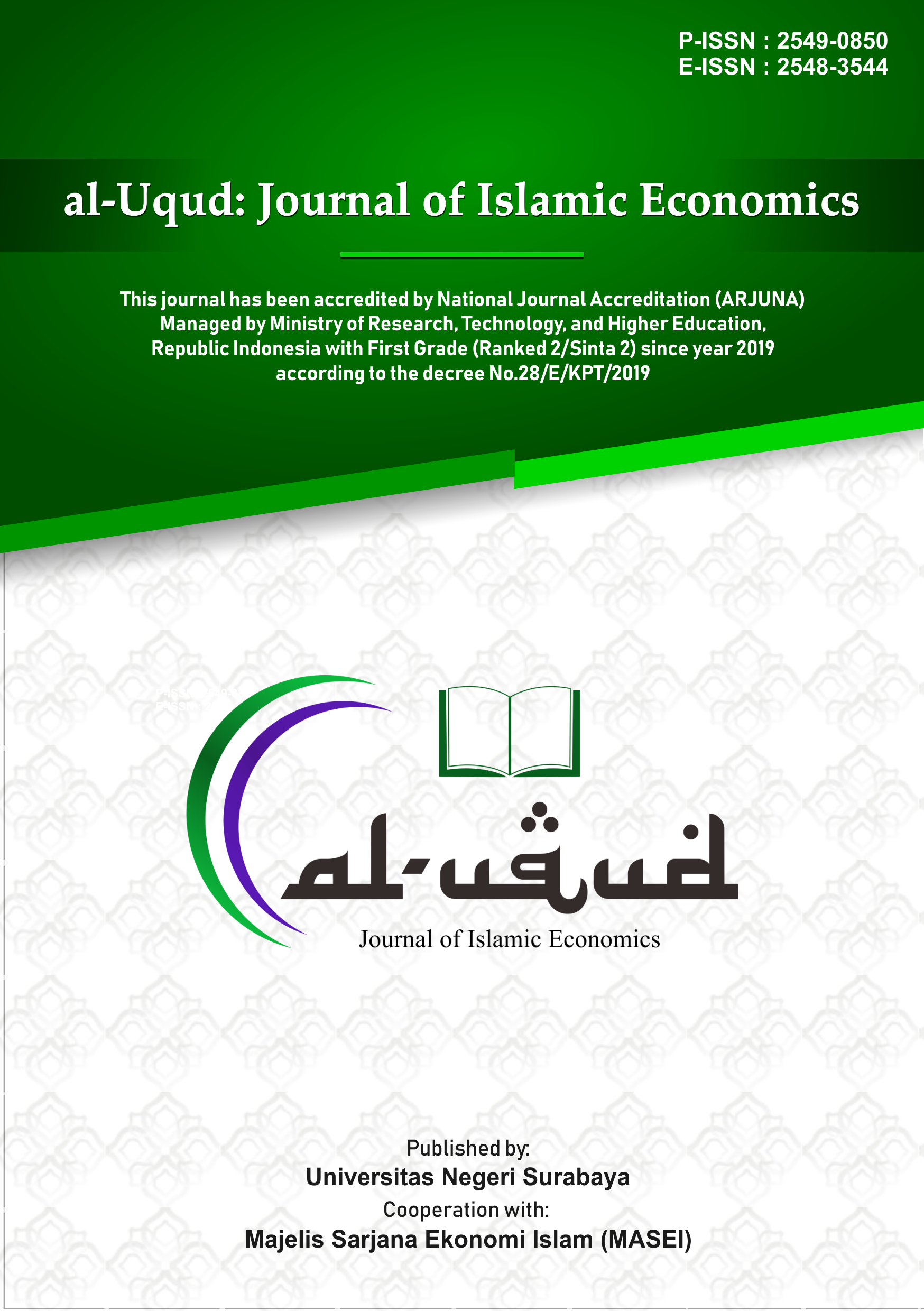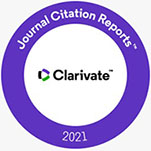The Role of Religiosity and Spirituality on Impulsive Buying
DOI:
https://doi.org/10.26740/al-uqud.v5n1.p119-150Keywords:
Religiosity, Spirituality, Impulsive buyingAbstract
This article aims to analyze religiosity and spirituality's roles to prevent the impulsivity of buying. Impulse buying is an irrational, unplanned, spontaneous buying behavior aimed to seek pleasure and emotional fulfillment. The research method is a literature study of journals related to religiosity and spirituality in customer decision making. The study results concluded that several factors cause impulsive buying, such as less self-control, hedonic lifestyle, and materialism. Furthermore, there are significant roles of religiosity and spirituality in encouraging robust self-regulation to prevent impulse buying. The higher a person's religiosity and spirituality, the better they build powerful self-control for impulse buying. This research is expected to contribute research in consumer behavior with an approach of religiosity and spirituality.
References
Akarsu, T. N. (2014). The relationship between Muslim religiosity price value consciousness impulsive buying tendency and post-purchase regret: a moderation analysis. Graduate Thesis Kadir Has University, http://academicrepository.khas.edu.tr/xmlui/handle/20.500.12469/2002.
Alam, S.S., Rohani, M.,& Badrul, H. (2011). Is Religiosity An Important Determinant on Muslim Consumer Behaviour in Malaysia? Journal Of Islamic Marketing, 2(1), 83-96. www.emeraldinsight.com/1759.0833.htm
Bandura, A. (1991). Social Cognitive Theory Of Self Regulation. Organizational Behavior and Human Decision Processes. 50,248-287. https://doi.org/0.1016/0749-5978(91)90022-L
Baumeister, R.F. (2002). Yielding to Temptation: Self Control Failure, Impulsive Purchasing, and Consumer Behavior. Journal of Consumer Research. 28(4), 670-676. https://www.jstor.org/stable/3131982
Baumeister, R.F.,et.al. (2008). Free Will in Consumer Behavior: Self Control, Ego Depletion And Choice. Journal of Consumer Psychology. 18, 4-13. https://doi.org/10.1016/j.jcps.2007.10.002
Baumeister, R.F., Kathleen, D.V & Dianne, M.T. (2011). The Strenght Model Of Self-Control. Current Directions in Psychological Science. 16(6), 351-355. https://doi.org/10.1111/j.1467-8721.2007.00534.x
Carter, E.C, Michael, E.M.,& Charles, S.C. (2012). The Mediating Role of Monitoring in The Association of Religion with Self Control.Social Psychological and Personality Science, 3(6), 691-697. https://doi:10.1177/1948550612438925
Dameyasani, A.W.,&Abraham, J. (2013). Impulse Buying, Cultural Values Dimensions and Symbolic Meaning of Money: A Study on College Students in Indonesia's Capital City and It's Surrounding. International Journal of Research Studies in Psychology, 2 (4). 35-52. https://doi:10.5861/ijrsp.2013.374
Emmons, R.A.,& Raymond, F.P. (2003). The Psychology of Religion. Annual Review of Psychology,54, 377-402. https://doi:10.1146/annurev.psych.54.101601.145024
Fianto, A.Y.A, Djumilah, H., Siti, A.,& Solimun. (2014). Development and Measurement of Islamic Values in Consumer Behavior Research. International Journal of Business and Management Invention,3 Issue 9, 01-10. www.ijbmi.org
Gailliot, M.T et al. (2007). Self-Control Relies on Glucose as Limited Energy Source: Willpower Is More Than A Metaphor. Journal of Personality And Social Psychology. 92(2), 325-336. https://doi.org/10.1037/0022-3514.92.2.325
Grinde, B. (1998). The Biology Of Religion: A Darwinian Gospel. Journal of Social And Evolutionary Systems, 21 (1), 19-28. https://doi: 10.1016/S1061-7361(99)80004-6
Hasyim, N., & Hamzah, M.I. (2014). 7P's: A Literature Reviews Of Islamic Marketing And Contemporary Marketing Mix. Procedia-Social And Behavioral Sciences, 155-159. https://doi:10.1016/j.sbspro.2014.04.019
Hausman, A. (2000). A Multi-Method Investigation Of Consumer Motivations In Impulse Buying Behavior. Journal of Consumer Marketing,17(2), 403-419. https://dx.doi.org/10.1108/07363760010341045
Hill, P.C., et al. (2000). Conceptualizing Religion and Spirituality: Points Of Commonality, Points Of Departure. Journal for The Theory Of Social Behavior, 30 (1), 51-77. https://doi.org/10.111/1468.5914.00119
Higgins, E.T. (1997). Beyond Pleasure And Pain. The American Psychological Association. 52(12), 1280-1300.https://doi.org/10.1037/0003-066X.52.12.1280
Higgins, E.T.(1998). Promotion And Prevention: Regulatory Focus As A Motivational Principle. Advances in Experimental Social Psychology. 30, 1-46. https://doi.org/10.1016/S0065-2601(08)60381-0
Higgins, E.T. (2002). How Self-Regulation Creates Distinct Values: The Case Of Promotion And Prevention Decision Making. Journal Of Consumer Psychology. 12(Issue 3), 177-191. https://doi.org/10.1207/S15327663JCP1203_01
Hoetoro, A., & Hannaf, M. S. (2019). The Relationship between Religiosity, Self-Interest, and Impulse Buying: an Islamic Perspective. IQTISHADIA, 12(1), 41-57. DOI: 10.21043/iqtishadia.v12i1.4501
Janssen, L. et.al 2008. The Path Of Least Resistance: Regulatory Resource Depletion And The Effectiveness Of Social Influence Techniques. Journal Of Business Research. Vol 61. Halaman 1041-1045. https://doi.org/10.1016/j.jbusres.2007.09.013
Kardes, F.R. (2002). Consumer Behavior and Managerial Decision Making. (2 ed). New Jersey: Prentice-Hall.
Karaduman, I. (2016). The Role Of Religious Sensibilities On The Relationship Between Religious Rules And Hedonic Product Consumption Behavior In Turkey. InternationalJournal Of Humanities And Social Science Invention, 5 Issue 4. 12-20.www.ijhssi.org
Khan, N., Lai, H.H., Tan, B.C., & Hong, Y.H. (2016). Impulse Buying Behavior Of Generation Y In Fashion Retail. International Journal Of Business And Management, 11(1), 144-151.www.ccsenet.org/ijbm
LaRose, R. & Matthew,S.E. (2002). Is Online Buying Out Of Control? Electronic Commerce And Consumer Self Regulation. Journal Of Broadcasting & Electronic Media. Vol 46 (4). Halaman 549-564. https://doi.org/10.1207/s15506878jobem4604-4
Lun, V.M.C. & Michael, H.B. (2013). Examining The Relation Of Religion And Spirituality To Subjective Well-Being Across National Cultures. Psychology Of Religion And Spirituality, 5(4), 304-315.https://doi:10.1037/a0033641
Mokhlis, S. (2009). Relevancy And Measurement Of Religiosity In Consumer Behavior Research. International Business Research, 2(3), 75-84.www.ccsenet/org/journal.html
Moran, B., Lane, B.& Lynn, E.K. (2015). Effect Of Stress, Materialism And External Stimuli on Online Impulse Buying. Journal of Research For Consumer, Issue 27.http//www.irconsumers.com/Academic Articles/issue 27/
Muhammad, N., Dick, M.& Katherine, M. (2010). The Constructs Mediating Religions Influence On Buyers And Consumers. Journal Of Islamic Marketing,1 Issue 2, 1-7.http://dx.doi.org/10.1108/17590831011055860
Musadik, S. H. S. A. & Azmi, I. A. G. (2017). A Conceptual Paper: the Effect of Islamic Religiosity on Impulse Buying Behavior. Journal of Global Business and Social Entrepreneurship (GBSE), 1(2), 137-147.
McDaniel, S.W. & Burnett, J.J. (1990). Consumer Religiosity And Retail Store Evaluative Criteria. Journal Of The Academy Of Marketing Science, 18(2), 101-112.https://doi.org/10/1007/BF02726426
Nayebzadeh, S & Maryam, J. (2014). Investigating Iranian Female Muslim Consumer Impulse Buying Behaviour Used As A Form Of Retail Therapy. Journal Of Islamic Marketing, Volume 5(2), 302-320.https://dx.doi.org/10.1108/JIMA-05-2012-0029
Negara, D. J., & Dharmmesta, B. S. (2003). Normative moderators of impulse buying behavior. Gadjah Mada International Journal of Business, 5(1), 1-14.
Peter, J.P. & Jerry, C.O. (2013). Perilaku Konsumen Dan Strategi Pemasaran. (9th ed.). Jakarta: Salemba Empat.
Piotrowska, M.Z. & Jaroslaw, P. (2016). Spiritual Transcendence, mortality Salience And Consumer Behaviors: Is Spirituality Opposite To Materialism?. International Journal Of Psychology and Behavior Analysis, 2(4), 1-6.https://dx.doi.org/10.15344/2455-3867/2016/112
Rook, D.W. & Hoch, S.J. (1985). Consuming Impulses. Advances In Consumer Research, 12, 23-27. https://www.acrwebsite/org
Rook, D.W.(1987). The Buying Impulse. Journal Of Consumer Research, Volume 14(2), 189-199.https://www.jstor.org/journals/jcr-inc.html.
Salwa, S.H, Ahmad, M & Ilhaamie, A.G.A. (2017). A Conceptual Paper: The Effect Of Islamic Religiosity On Impulse Buying Behavior. Journal Of Global Business And Social Entrepreneurship (GBSE), 1(2), 137-147.https://www.semanticscholar.org
Silvera, D.H, Anne, M.L & Fredric, K. 2008. Impulse Buying: The Role Of Affect, Social Influence And Subjective Wellbeing. Journal Of Consumer Marketing. Volume 25(1). Halaman 23-33. https://doi.org/10.1108/07353760810845381
Sultan, A.J., Jeff, J & David, E.S. 2012. Building Consumer Self Control: The Effect Of Self Control Exercises Of Impulse Buying Urges, Mark Lett. Vol 23. Halaman 61-72. https://doi:10.1007/s11002-011-9135-4
Sharma, P., Bharadhwaj, S. & Roger, M. (2010). Impulse Buying And Variety Seeking: A Trait-Correlates Perspective. Journal Of Business Research, 63, 276-283.https://doi:10.1016/j.jbusres.2009.03.013
Sharma, P., Bharadhwaj, S. & Roger, M. (2014). Exploring Impulse Buying In service: Toward An Integrative Framework. Journal Of the Academic Marketing Science, 42,154-170.https://doi 10.1007/s11747-013-0346-5
Schiffman, L.G. & Kanuk, L.L. (2010). Consumer Behavior. New Jersey: Pearson-Prentice Hall.
Skousgaard, H. (2006). A Taxonomy Of Spiritual Motivations For Consumption. Advances In Consumer Research, 33, 293-296.https://www.acrwebsite.org.volumes/12387/volumes/v33/NA-33
Stillman, T.F, et al. (2012). The Material And Immaterial In Conflict: Spirituality Reduces Conspicuous Consumption. Journal Of Economic Psychology, 33,1-7. https://doi:10.1018/j.joep.2011.08.012
Swimberghe, K, Sharma, D & Flurry, L. (2009). An Exploratory Investigation Of The Consumer Religious Commitment And Its Influence On Store Loyalty. Journal of Consumer Marketing, 1-24. https://doi:10.1108/07363760910976592
Tangney, J.P, Baumeister, R.F & Boone, A.L. (2004). Hight Self-Control Predicts Good Adjustment, Less Pathology, Better Grades And Interpersonal Success. Journal Of personality. 72(Issue 2), 271-322.https://doi.org/10.1111/j.0022-3506.2004.00263.x
Tifferet, S. & Ram, H. (2012). Gender Differences In Brand Commitment, Impulse Buying And Hedonic Consumption. Journal Of Product And Brand Management. Volume 21(3). Halaman 176-182. https://doi:10.1108/10610421211228703
Underwood, L.G. (2011). The Daily Spiritual Experience Scale : Overview And Result. Religions, 2(1), 29-50.https://www/mdpi.com
Vohs, K.D. et.al (2008). Making Choices Impairs Subsequent Self Control: A Limited Resource Account Of Decision Making, Self Regulation, And Active Initiative. Journal Of Personality And Social Psychology. 94(5), 883-898.https://doi.org/10.1037/0022-3514.94.5.883
Vohs & Ronald J.F. 2007. Spent Resources: Self Regulatory Resource Availability Affects Impulse Buying. Journal of Consumer Research. Vol 33. https://doi:10.1086/510228
Watson, P.J., Jones, N.D, & Morris, R.J. (2004). Religious Orientation And Attitudes Toward Money: Relationships With Narcissism And The Influence Of Gender, Mental Health. Religion And Culture, 7(4), 277-288.http://dx.doi.org/10.1080/13674670310001606478
Wilkes, R.E, Burnett, J.J, & Howell, R.D. (1986). On The Meaning And Measurement Of Religiosity In Consumer Research. Journal Of The Academy Of Marketing Science, 14(1), 47-56. https://doi.org/10.1007/BF02722112
Wilson, J.A & Liu, J. (2011). The Challenges Of Islamic Branding: Navigating Emotions And Halal. Journal Of Islamic Marketing, 2(1), 28-42.https://doi.10.1108/17590831111115222
Witteveen, H.J. (2004). Tasawuf In Action : Spiritualisasi Diri Di Dunia Yang Tak Lagi Ramah. Jakarta: PT. Serambi Ilmu Semesta.
Wood, R & Albert, B. (1989). Social Cognitive Theory Of Organizational Management. Academy of Management Review. 14(3). 361-384.https://doi.org/10.5465/amr.1989.4279067
Worthington, E.L., et al. (2003). The Religious Commitment Inventory-10: Development, Refinement, And Validation Of A Brief Scale for Research And Counseling. Journal Of Counseling Psychology, 50(1), 84-96.https://doi.10.1037/0022-0167.50.1.84
Yeniaras, V. (2016). Uncovering the Relationship between Materialism, Status Consumption, and Impulsive Buying: Newfound Status of Islamist in Turkey. Journal for the Study of Religions and Ideologies, 15(44), 153-177, https://www.ceeol.com/search/article-detail?id=538394
Downloads
Published
How to Cite
Issue
Section
License
CC BY 4.0 Abstract views: 1674
,
Abstract views: 1674
, PDF Downloads: 1636
PDF Downloads: 1636








